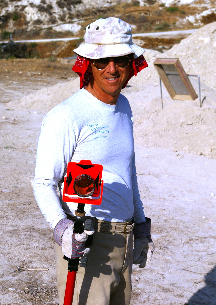I’m often asked by new students how to land good archaeology jobs. Archaeology companies want field archaeologists ready to go on Day 1. Few companies want to pay someone they have to train, so how do you get the needed experience before getting hired?

John with the Staff of Ra
Field Methods Courses Pave the Way…
The best thing you can do is get an archaeology field methods course under your belt. The course can be one offered during the school year, with work at or near campus. Summer field schools during which students live on or near a site are also available. They are usually more expensive, but can be very exciting and rewarding ways to pick up your basic skills. My field school was at Arizona State University during the school year. We worked on a Hohokam site in the Phoenix Basin. (I got my first paying archaeology job after that semester.) The specific culture area isn’t important. What is important is the basic skills you will pick up that will allow you to scientifically excavate and record an archaeological site. These skills are applicable in any cultural area, and it is these skills that employers are looking for. Click here to see current field schools accepting applications.
Volunteering will get your foot in the door…
Another path to a job with an archaeology firm is to volunteer your services, either individually or through various archaeology clubs or societies. I have hired individuals who had yet to attend field schools after watching them as volunteers. They had quickly picked up the skills and added value to the company’s effort, proving on the ground that they could make a contribution.
Resumes are a must in this field…
Have a resume or curriculum vitae ready. Archaeology companies that don’t have work available on one day may have something not far down the line and we always went to the stack of CVs when we had to add staff. Include the volunteer work in the CV. It is a plus for the prospect when a company is filling out its ranks for a project.
Diversified skills can help you stand out in a crowd…
It never hurts to have additional skills that can contribute to the project, both in the field and when it has come in from the field. Can you operate surveying equipment? Do you have skills with database software, mapping or drawing programs and statistical analysis packages? Be someone that a company will want to keep around and keep gainfully employed in the office or lab until it is time to return to the field. Once you land that job you are going need some equipment so click here to see the different tools you will need.

